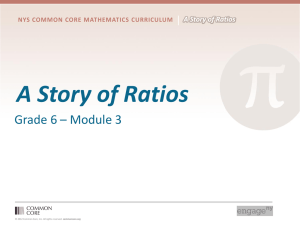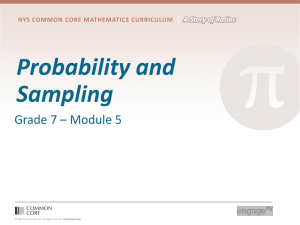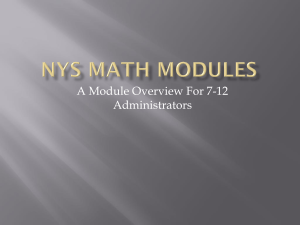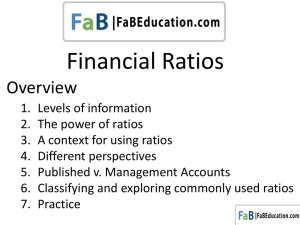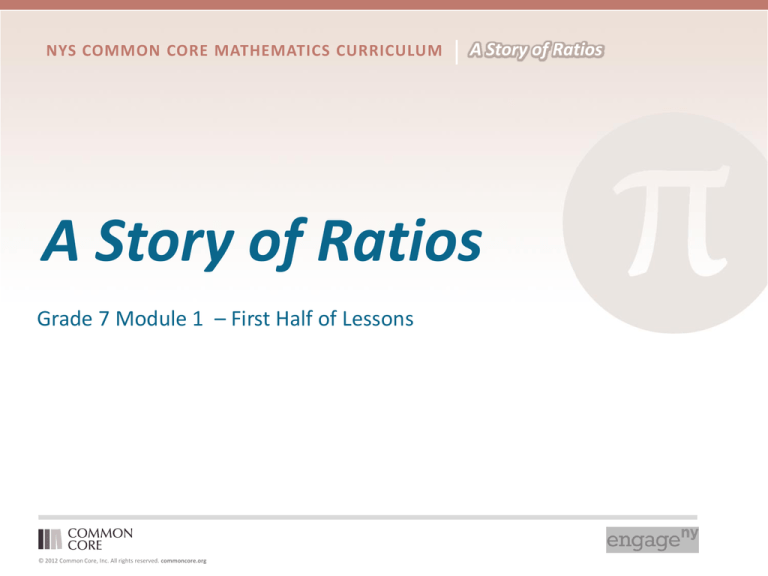
NYS COMMON CORE MATHEMATICS CURRICULUM
A Story of Ratios
A Story of Ratios
Grade 7 Module 1 – First Half of Lessons
© 2012 Common Core, Inc. All rights reserved. commoncore.org
NYS COMMON CORE MATHEMATICS CURRICULUM
A Story of Ratios
Objectives
• Articulate and model the instructional approaches to
teaching the content of the first half of the lessons.
• Examine how the topics and lessons promote mastery
of the focus standards and address the major work of
the grade.
• Articulate connections from the content of previous
grade levels to the content of this module.
© 2012 Common Core, Inc. All rights reserved. commoncore.org
NYS COMMON CORE MATHEMATICS CURRICULUM
Participant Poll
•
•
•
•
•
Classroom teacher
School leader
Principal
District leader
BOCES representative
© 2012 Common Core, Inc. All rights reserved. commoncore.org
A Story of Ratios
NYS COMMON CORE MATHEMATICS CURRICULUM
A Story of Ratios
Agenda
• Review of Module Overview
• In-Depth Examination of Module 1 Topics A and B: Lessons 1-10
• Analysis of Topic Openers
• Features of Student and Teacher Materials
• Modeling of Lesson Components
• Coherence Across Grade Levels
• Closure and Reflections
© 2012 Common Core, Inc. All rights reserved. commoncore.org
NYS COMMON CORE MATHEMATICS CURRICULUM
A Story of Ratios
A Story of Ratios Curriculum Overview
© 2012 Common Core, Inc. All rights reserved. commoncore.org
A Story of Ratios
NYS COMMON CORE MATHEMATICS CURRICULUM
Review of Module Structure
Module Overview
Topic
L1
L2
L3L4
Topic
L5L6
© 2012 Common Core, Inc. All rights reserved. commoncore.org
L7
L8L9
L10
Topic
L11L12
L13
L14
Topic
L15
L16
L17
L18
L19
L20
L21L22
NYS COMMON CORE MATHEMATICS CURRICULUM
Grade 7 Module 1 Overview
© 2012 Common Core, Inc. All rights reserved. commoncore.org
A Story of Ratios
NYS COMMON CORE MATHEMATICS CURRICULUM
Grade 7 Module 1 Overview
© 2012 Common Core, Inc. All rights reserved. commoncore.org
A Story of Ratios
NYS COMMON CORE MATHEMATICS CURRICULUM
A Story of Ratios
What’s in G7-M1?
Topic A: Explore what it means to be proportional to and how to determine if
two types of quantities are in a proportional relationship, examining both
tables and graphs
Topic B: Define the constant of proportionality and use it to represent
proportional relationships with an equation, interpret the meaning of key
points on the graph- (0,0) and (1,r) where r is the unit rate
Topic C: Compute unit rates involving fractions, find equivalent ratios of two
partial quantities given a part-to-part ratio and the total of the quantities,
solve multi-step ratio problems including markup, markdown, and
commission
Topic D: Explore scale drawings and recognize the term scale factor as the
constant of proportionality
© 2012 Common Core, Inc. All rights reserved. commoncore.org
NYS COMMON CORE MATHEMATICS CURRICULUM
Topic Openers
• Read the concept
chart and the
descriptive
narrative.
• Make note of the
important
information that
will help teachers
implement these
lessons.
© 2012 Common Core, Inc. All rights reserved. commoncore.org
A Story of Ratios
NYS COMMON CORE MATHEMATICS CURRICULUM
A Story of Ratios
Types of Lessons
1. Problem Set
Students and teachers work through examples and complete
exercises to develop or reinforce a concept or procedure.
2. Socratic
Teacher leads students in a conversation to develop a specific
concept or proof.
3. Exploration
Independent or small group work on a challenging problem
followed by debrief to clarify, expand or develop math knowledge
4. Modeling
Students and teacher practice part of the modeling cycle with
problems that are ill-defined and have a real world context.
© 2012 Common Core, Inc. All rights reserved. commoncore.org
NYS COMMON CORE MATHEMATICS CURRICULUM
A Story of Ratios
Lesson 1: An Experience in Relationships as
Measuring Rate
Sample Exercise: Paper Passing
Directions
• One participant at each table, take stack of papers
out of large envelope labeled A.
• On my command, take one and pass the remaining
stack to the left. Continue passing until all
participants have one paper.
• Last person Stand Up when all participants have a
paper (remain standing until further instructions).
© 2012 Common Core, Inc. All rights reserved. commoncore.org
NYS COMMON CORE MATHEMATICS CURRICULUM
A Story of Ratios
Ratio and Rate from Grade 6
Ratio: A pair of numbers
Value of a Ratio: Students described the fraction A / B associated with the
ratio A : B as the value of the ratio A to B.
Rate: A ratio of two quantities
Unit rate: The value of the ratio
Rate’s unit: The label, e.g. mph
Equivalent Ratios: Two ratios 𝐴:𝐵 and 𝐶:𝐷 are equivalent ratios if there is a
positive number, 𝑐, such that 𝐶=𝑐𝐴 and 𝐷=𝑐𝐵. Students understood
equivalent ratios to have the same value.
© 2012 Common Core, Inc. All rights reserved. commoncore.org
NYS COMMON CORE MATHEMATICS CURRICULUM
A Story of Ratios
Lesson 1: An Experience in Relationships as
Measuring Rate
Example 1: Paper Passing
• Why this problem?
© 2012 Common Core, Inc. All rights reserved. commoncore.org
NYS COMMON CORE MATHEMATICS CURRICULUM
A Story of Ratios
Ratio and Rate from Grade 6
Ratio: A pair of numbers
Value of a Ratio: Students described the fraction A / B associated with the
ratio A : B as the value of the ratio A to B.
Rate: A ratio of two quantities
Unit rate: The value of the ratio
Rate’s unit: The label, e.g. mph
Equivalent Ratios: Two ratios 𝐴:𝐵 and 𝐶:𝐷 are equivalent ratios if there is a
positive number, 𝑐, such that 𝐶=𝑐𝐴 and 𝐷=𝑐𝐵. Students understood
equivalent ratios to have the same value.
© 2012 Common Core, Inc. All rights reserved. commoncore.org
NYS COMMON CORE MATHEMATICS CURRICULUM
A Story of Ratios
Meet Your Table
Talk to your table to determine who is currently teaching in a classroom.
Write a ratio of teachers to non-teachers to reflect the participants at your
table.
Enter this information in the first line of your table.
© 2012 Common Core, Inc. All rights reserved. commoncore.org
NYS COMMON CORE MATHEMATICS CURRICULUM
A Story of Ratios
Lesson 1: An Experience in Relationships as
Measuring Rate
Content
Scan the lesson to identify what content is addressed in the problems for this
lesson. What are kids being asked to do?
Turn and talk with others at your table
about your observations.
© 2012 Common Core, Inc. All rights reserved. commoncore.org
A Story of Ratios
NYS COMMON CORE MATHEMATICS CURRICULUM
Lesson Organization
Teacher
• Student Outcomes
• Lesson Notes (in select lessons)
• Classwork
• General directions and guidance, including timing guidance
• Discussion points with expected student responses
• Student classwork with solutions
• Scaffolding Boxes
• Exit Ticket
• Problem Set (with solutions)
© 2012 Common Core, Inc. All rights reserved. commoncore.org
Student
• Classwork
• Problem Set
NYS COMMON CORE MATHEMATICS CURRICULUM
A Story of Ratios
Lesson 1: An Experience in Relationships as
Measuring Rate
Exit Ticket
Tillman the English Bulldog
Insert video link
http://www.youtube.com/watch?feature=player_embedded&v=tCKstDXMslQ
© 2012 Common Core, Inc. All rights reserved. commoncore.org
NYS COMMON CORE MATHEMATICS CURRICULUM
A Story of Ratios
Exit Ticket Reflection
What do you notice about the exit ticket? How does it compare to what you
have used in the classroom or have seen teachers use in the past?
Take 3 minutes to talk with your table.
© 2012 Common Core, Inc. All rights reserved. commoncore.org
NYS COMMON CORE MATHEMATICS CURRICULUM
A Story of Ratios
Lesson 2: Proportional Relationships
• This lesson
introduces the
notion of
Proportional
Relationship
• Serves as the
connecting piece
from Grade 6 to
Grade 8
© 2012 Common Core, Inc. All rights reserved. commoncore.org
Grade 6
Grade 7
Grade 8
and up
• Ratios
• Equivalent Ratios
• Rate and Unit Rate
• Proportional Relationship
• Unit Rate as Constant of Proportionality
• Linear Relationships
• Study of Functions
A Story of Ratios
NYS COMMON CORE MATHEMATICS CURRICULUM
Lesson 2: Proportional Relationships
Classwork
Example 1: Pay by the Ounce Frozen Yogurt!
A new self-serve frozen yogurt store opened this summer
that sells its yogurt at a price based upon the total weight of
the yogurt and its toppings in a dish. Each member of
Isabelle’s family weighed their dish and this is what they
found.
Weight
12.5
10
5
8
(ounces)
Cost ($)
5
4
2
is ______________________
proportional
to Weight.
Cost ____
____
© 2012 Common Core, Inc. All rights reserved. commoncore.org
3.20
NYS COMMON CORE MATHEMATICS CURRICULUM
A Story of Ratios
Lesson 2: Proportional Relationships
Classwork
Example 1: Pay by the Ounce Frozen Yogurt!
• 0.4
© 2012 Common Core, Inc. All rights reserved. commoncore.org
NYS COMMON CORE MATHEMATICS CURRICULUM
A Story of Ratios
Lesson 2: Proportional Relationships
Example 2: A Cooking Cheat Sheet!
In the back of a recipe book, a diagram provides easy conversions to use while
cooking.
Ounces ____ ______________________ ____ Cups.
© 2012 Common Core, Inc. All rights reserved. commoncore.org
NYS COMMON CORE MATHEMATICS CURRICULUM
A Story of Ratios
Lesson 2: Proportional Relationships
Exercise 1
During Jose’s physical education class today, students visited activity stations.
Next to each station was a chart depicting how many Calories (on average)
would be burned by completing the activity.
a. Is the number of Calories burned proportional to time? How do you know?
b. If Jose jumped rope for 6.5 minutes, how many calories would he expect to
burn?
© 2012 Common Core, Inc. All rights reserved. commoncore.org
NYS COMMON CORE MATHEMATICS CURRICULUM
A Story of Ratios
Lesson 2: Proportional Relationships
Closing
How do we know if two quantities are proportional to each other?
Two quantities are proportional to each other if there is one constant number
that is multiplied by each measure in the first quantity to give the
corresponding measure in the second quantity.
How can we recognize a proportional relationship when looking at a table or a
set of ratios?
If each of the measures in the second quantity is divided by its
corresponding measure in the first quantity and it produces the
same number, called a constant, then the two quantities are
proportional to each other.
© 2012 Common Core, Inc. All rights reserved. commoncore.org
NYS COMMON CORE MATHEMATICS CURRICULUM
A Story of Ratios
Lessons 3-4: Identifying Proportional and
Non-Proportional Relationships in Tables
Lesson 3 Opening Exercise:
You have been hired by your neighbor to
babysit their children Friday night. You
are paid $8 per hour. Complete the
table relating your pay to the number
of hours you worked.
Based on the table above, is pay
proportional to hours worked? How
do you know?
© 2012 Common Core, Inc. All rights reserved. commoncore.org
NYS COMMON CORE MATHEMATICS CURRICULUM
A Story of Ratios
Lessons 3-4: Identifying Proportional and
Non-Proportional Relationships in Tables
Lesson 3: Compare and contrast Examples 1 and 2.
Share your observations with a neighbor.
© 2012 Common Core, Inc. All rights reserved. commoncore.org
NYS COMMON CORE MATHEMATICS CURRICULUM
A Story of Ratios
Lessons 3-4: Identifying Proportional and
Non-Proportional Relationships in Tables
Lesson 4 Example: Which team will win Randy’s race?
Take 10 minutes to complete all parts of the problem independently.
Take 5 minutes to share your solutions at your table.
• Be sure to explain your approach to the problem.
• Be prepared to share your approach with the whole group.
© 2012 Common Core, Inc. All rights reserved. commoncore.org
A Story of Ratios
NYS COMMON CORE MATHEMATICS CURRICULUM
Lessons 5-6: Identifying Proportional and
Non-Proportional Relationships in Graphs
Classwork
Opening Exercise:
Isaiah is selling candy bars to help raise money for
his scouting troop. The table shows the amount
of candy he sold to the money he received.
Is the amount of chocolate bars sold proportional
to the money Isaiah received?
How do you know?
© 2012 Common Core, Inc. All rights reserved. commoncore.org
x
Chocolate
Bars Sold
y
Money
Received
($)
2
3
4
5
8
9
12
12
A Story of Ratios
NYS COMMON CORE MATHEMATICS CURRICULUM
Lessons 5-6: Identifying Proportional and
Non-Proportional Relationships in Graphs
Example 1: From a table to graph
Create another ratio table that contain
two sets of quantities that are
proportional to each other using the
first set of ratios on the table.
© 2012 Common Core, Inc. All rights reserved. commoncore.org
x
y
2
3
NYS COMMON CORE MATHEMATICS CURRICULUM
A Story of Ratios
Lessons 5-6: Identifying Proportional and
Non-Proportional Relationships in Graphs
What is a common mistake a student might make when deciding whether a
graph of two quantities shows that they are proportional to each other?
How might we counteract this common misconception?
© 2012 Common Core, Inc. All rights reserved. commoncore.org
NYS COMMON CORE MATHEMATICS CURRICULUM
A Story of Ratios
Lessons 5-6: Identifying Proportional and
Non-Proportional Relationships in Graphs
Table Activity:
Look in Envelope 6 and take 10 minutes to discuss the
given problem and have one table member record
responses on the chart paper. At the end of the
time, we will post the chart paper on the wall and
have an opportunity to participate in gallery walk.
© 2012 Common Core, Inc. All rights reserved. commoncore.org
NYS COMMON CORE MATHEMATICS CURRICULUM
A Story of Ratios
Lessons 5-6: Identifying Proportional and
Non-Proportional Relationships in Graphs
Gallery Walk
Use Sticky Notes to…
• Note differences found in groups who had the same
ratios.
• Note any common mistakes and how it could be fixed.
• Note any a poster that stood out that represented their
problems and findings exceptionally clear.
© 2012 Common Core, Inc. All rights reserved. commoncore.org
NYS COMMON CORE MATHEMATICS CURRICULUM
A Story of Ratios
Conclusion of Topic A
Take a few moments to reflect upon how you will be able to promote
successful implementation of these lessons in your classroom, school,
district, and/or BOCES?
What do you think teachers would need to know?
© 2012 Common Core, Inc. All rights reserved. commoncore.org
NYS COMMON CORE MATHEMATICS CURRICULUM
A Story of Ratios
Topic Opener
In Topic B, students learn to identify the constant of proportionality
by finding the unit rate in the collection of equivalent ratios. They
represent this relationship with equations of the form y = kx, where
k is the constant of proportionality (7.RP.2, 7.RP.2c). In Lessons 8
and 9, students derive the constant of proportionality from the
description of a real world context and relate the equation
representing the relationship to a corresponding ratio table and/or
graphical representation (7.RP.2b, 7.EE.4). Topic B concludes
with students consolidating their graphical understandings of
proportional relationships as they interpret the meanings of the
points (0,0) and (1, r), where r is the unit rate, in terms of the
situation or context of a given problem (7.RP.2d).
© 2012 Common Core, Inc. All rights reserved. commoncore.org
NYS COMMON CORE MATHEMATICS CURRICULUM
A Story of Ratios
Lesson 7: Unit Rate as the Constant of
Proportionality
Haven’t we already learned about the Constant of Proportionality?
Why is this lesson here?
© 2012 Common Core, Inc. All rights reserved. commoncore.org
NYS COMMON CORE MATHEMATICS CURRICULUM
A Story of Ratios
Lesson 7: Unit Rate as the Constant of
Proportionality
Closing Questions
What is another name for the number that relates the measures of two
quantities? (How do I get from x to y?)
How is the Constant of Proportionality related to the unit rate?
© 2012 Common Core, Inc. All rights reserved. commoncore.org
NYS COMMON CORE MATHEMATICS CURRICULUM
A Story of Ratios
Lesson 7: Unit Rate as the Constant of
Proportionality
Exit Ticket
Susan and John are buying cold drinks for a neighborhood picnic, where
each person is expected to drink 1 can of soda. Susan says that if you
multiply the unit price for a can of soda by the number of people
attending the picnic, you will be able to determine the total cost of
the soda. John says that if you divide the cost of a 12-pack of soda by
the number of sodas, you will be able to determine the total cost of
the sodas.
Who is right and why?
© 2012 Common Core, Inc. All rights reserved. commoncore.org
NYS COMMON CORE MATHEMATICS CURRICULUM
A Story of Ratios
Lesson 7: Unit Rate as the Constant of
Proportionality
Exit Ticket Solution
© 2012 Common Core, Inc. All rights reserved. commoncore.org
NYS COMMON CORE MATHEMATICS CURRICULUM
A Story of Ratios
Lesson 8-9: Representing Proportional
Relationships with Equations
Take 15 minutes to go through Lesson 8, completing Examples 1 and 2 and any
2 questions from the Problem Set. Feel free to compare your answers with
what is provided in the teacher materials.
© 2012 Common Core, Inc. All rights reserved. commoncore.org
NYS COMMON CORE MATHEMATICS CURRICULUM
A Story of Ratios
Lesson 8-9: Representing Proportional
Relationships with Equations
Discuss at your table:
What is the main idea of this lesson?
How do the Examples prepare students to find success with the Problem Set?
© 2012 Common Core, Inc. All rights reserved. commoncore.org
NYS COMMON CORE MATHEMATICS CURRICULUM
A Story of Ratios
Lesson 8-9: Representing Proportional
Relationships with Equations
Lesson 9 Exit Ticket
Oscar and Maria each wrote an equation that they felt represented the
proportional relationship between distance in km and distance in miles.
One entry in the table paired 150 km with 93 miles. If k = number of
kilometers and m= number of miles, who wrote the correct equation
that would relate miles to kilometers and why?
© 2012 Common Core, Inc. All rights reserved. commoncore.org
NYS COMMON CORE MATHEMATICS CURRICULUM
A Story of Ratios
Lesson 10: Interpreting Graphs of
Proportional Relationships
Spend 3 minutes previewing Lesson 10 materials.
What are your initial observations about this lesson?
Take 15 minutes to complete Examples 1 and 2.
How do you anticipate students will respond
to this lesson?
© 2012 Common Core, Inc. All rights reserved. commoncore.org
NYS COMMON CORE MATHEMATICS CURRICULUM
A Story of Ratios
Biggest Takeaway
•
What is your biggest takeaway from this session? Think for just 1 minute.
•
“Whip Around” the table to share.
© 2012 Common Core, Inc. All rights reserved. commoncore.org
NYS COMMON CORE MATHEMATICS CURRICULUM
A Story of Ratios
Key Points
• Lessons are designed for students to be active learners. Teacher
questioning guides students to explore ideas, investigate natural questions,
and develop the big ideas that are the focus of the module. They are
uncovering the story.
• Students use the study of ratios in Grade 6 as a foundation to examine the
characteristics of a proportional relationship in Grade 7.
• Students make connections between multiple representations of
proportional relationships (verbal, diagram, table, graph) using each one to
develop a deeper understanding of what really make a proportional
relationship.
© 2012 Common Core, Inc. All rights reserved. commoncore.org
NYS COMMON CORE MATHEMATICS CURRICULUM
A Story of Ratios
A Story of Ratios
G7-M1 : Mid-Module Assessment
© 2012 Common Core, Inc. All rights reserved. commoncore.org
NYS COMMON CORE MATHEMATICS CURRICULUM
A Story of Ratios
Objectives
• To articulate critical aspects of instruction that
prepare students to express reasoning and/or
conduct modeling required on the mid-module
assessment
© 2012 Common Core, Inc. All rights reserved. commoncore.org
NYS COMMON CORE MATHEMATICS CURRICULUM
A Story of Ratios
Agenda
• View and complete the Mid-Module Assessment.
• Discuss the rubric and use it to score each other’s assessment.
• Share notable examples of work and scoring.
• Round-table and whole group discussions at various times in
the session related to the assessment questions and scoring.
© 2012 Common Core, Inc. All rights reserved. commoncore.org
NYS COMMON CORE MATHEMATICS CURRICULUM
A Story of Ratios
G7-M1: Ratios and Proportional Relationships
© 2012 Common Core, Inc. All rights reserved. commoncore.org
NYS COMMON CORE MATHEMATICS CURRICULUM
G7-M1 Mid-Module Assessment
© 2012 Common Core, Inc. All rights reserved. commoncore.org
A Story of Ratios
NYS COMMON CORE MATHEMATICS CURRICULUM
Standards Assessed
• Which Topics and Standards will be assessed?
© 2012 Common Core, Inc. All rights reserved. commoncore.org
A Story of Ratios
NYS COMMON CORE MATHEMATICS CURRICULUM
Understanding the Assessment
© 2012 Common Core, Inc. All rights reserved. commoncore.org
A Story of Ratios
NYS COMMON CORE MATHEMATICS CURRICULUM
A Progression Toward Mastery
© 2012 Common Core, Inc. All rights reserved. commoncore.org
A Story of Ratios
NYS COMMON CORE MATHEMATICS CURRICULUM
Scoring Student Work
© 2012 Common Core, Inc. All rights reserved. commoncore.org
A Story of Ratios
NYS COMMON CORE MATHEMATICS CURRICULUM
Sharing Student Work
© 2012 Common Core, Inc. All rights reserved. commoncore.org
A Story of Ratios
NYS COMMON CORE MATHEMATICS CURRICULUM
A Story of Ratios
Standards for Mathematical Practice
© 2012 Common Core, Inc. All rights reserved. commoncore.org
NYS COMMON CORE MATHEMATICS CURRICULUM
A Story of Ratios
Evidence of the Mathematical Practices
• How and where do they appear in the assessment items?
© 2012 Common Core, Inc. All rights reserved. commoncore.org
NYS COMMON CORE MATHEMATICS CURRICULUM
Biggest Takeaway
© 2012 Common Core, Inc. All rights reserved. commoncore.org
A Story of Ratios
NYS COMMON CORE MATHEMATICS CURRICULUM
Key Points
• Assessment questions
• Are directly aligned to the CCSSM
• May address multiple learning standards
• Are formatted to invoke higher level thinking and address MPs
• Scoring Rubric
• Progression Toward Mastery
© 2012 Common Core, Inc. All rights reserved. commoncore.org
A Story of Ratios



